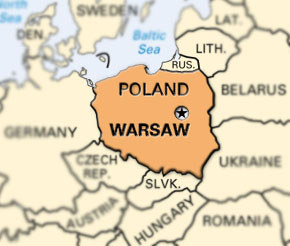Africans in Poland gradually sinking roots
 Warsaw - African immigrants may no longer draw stares in Poland's bigger cities, but problems remain for the tiny community as it strives to make its voice heard and combat stereotypes in the largely white former Soviet bloc.
Warsaw - African immigrants may no longer draw stares in Poland's bigger cities, but problems remain for the tiny community as it strives to make its voice heard and combat stereotypes in the largely white former Soviet bloc.
While today many people of African descent say they are treated well in the deeply Catholic nation, they add that Poles still have negative ideas about the African continent and are too accepting of racist jokes.
Pawel Sredzinski was the brains behind a recent photo exhibit in Warsaw that featured African immigrants living in the capital, titled We Varsovians.
Sredzinski estimates some 3,000-4,000 Africans currently live in Poland. While a black man no longer draws attention on a Warsaw street, things are different in smaller cities.
"I wanted to show that alongside white Varsovians, there are blacks who also come here and that our daily life looks the same," Sredzinski told the German Press Agency dpa.
"I think Warsaw is ready for multiculturalism, but we want to take this (exhibit) into smaller towns where they might not be ready."
Poland has come a long way since the decades of communism, when it was home to few immigrants and virtually no blacks.
Mamadou Wague, of the Friends of Africa Association, remembers his first days at Warsaw's University of Life Sciences in 1979.
He recalled with a laugh how fingers were pointed at him and a curious crowd gathered in his dormitory room. Wague, who comes from Guinea in West Africa, was the first black man many of the Polish students had ever seen.
He estimates that around 60,000 Africans came to Poland to study from 1958-80 under the communist regime's exchange programmes with socialist countries in Africa.
Most returned home on graduation. These days, some 200 immigrants arrive annually from sub-Saharan Africa, according to Wague. Many Africans prefer countries like France or Britain, where migrants from former colonies face no language barriers.
While there is no shortage of prominent Africans with Polish nationality, the media tends to focus exclusively on the illegal African immigrants who work in Warsaw bazaars.
Mamadou Diouf, founder of the Africa Another Way Foundation, said nobody monitors the racial situation in Poland, where people use expressions like, "a hundred years behind the blacks," and shrug off similar comments as jokes.
In June, Polish priest Tadeusz Rydzyk said to a black missionary during a pilgrimage: "Look, he hasn't washed at all." Foreign Minister Radoslaw Sikorski is on record as having joked to colleagues that US President Barack Obama had a Polish connection because "his grandfather ate a Polish missionary."
"It's high time someone keeps track when someone makes a comment like this," Diouf said. "That's the problem in this country. I'm not even talking about racism, but there's no critique when someone says these things."
But as more immigrants begin to arrive, their tiny community is increasingly being heard and forming organizations that unite Africans and reach out to Poles.
Engineer Alioune Diop, who came to Poland in 1990 from Senegal, said things are changing as the African community becomes increasingly organized.
Diop runs the Polish-Senegal Association and aims to create an African centre that would help new immigrants and give Africans in Poland a chance to network and socialize.
"In the 1990s there were very few of us, and they came mainly to study, and it was impossible to meet an African who wasn't a student," Diop said. "There's still a lot missing, and we could be better organized."
While some make a stop in Poland before moving elsewhere, those who settle say they are just as Polish as their white-skinned compatriots.
Wague decided to make Poland his home after years spent as researcher with professors who treated him like family.
"I sat with them on the same school bench, I know their families, I was witness at their weddings, their divorces," he says. "I'm here in Poland because I spent my youth here and have many friends, not because I want to earn money."
He currently lectures in the Department of Economic Development at Warsaw University. He was granted Polish citizenship in 2005.
"I picked Poland," Wague says, "because I love this country." (dpa)